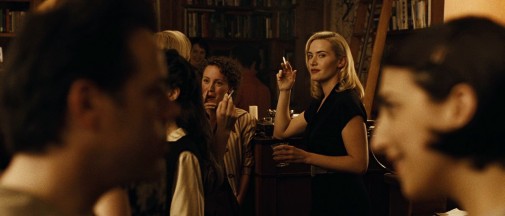Here's Cláudio Alves with a new series on performances that got lots of precursor love but no Oscar nomination. Previously we discussed Emma Thompson in Saving Mr Banks...

January 11th, 2009 was Kate Winslet's night. After years of scoring endless nominations and very few victories, her effortful Oscar campaign was finally kicking into high gear. She had not one, but two triumphant victories on the Golden Globes' stage. In Best Supporting Actress, she won for her (leading) role inThe Reader and secured her frontrunner status. In Best Actress - Drama, she won for Revolutionary Road. After such a merry evening, many were expecting a double citation come Oscar morning. One thing was for sure – one way or the other, Kate Winslet would end the Awards Season with a little golden man in her hands.
Still, the campaign manipulations that worked hard to secure her two nominations failed at the last minute, when the Academy showed rare lucidity against the folly of category fraud...
Instead of two nominations, she got just one, in Best Actress. More surprisingly was that, of the two performances, the Oscars opted for the more sidelined and complicated one, snubbing the suburban melodrama instead. And so it was that the season's prophecy came true and Kate Winslet became an Oscar winner for her performance in The Reader. Even so, there's a matter that remains up for debate – did she win for the right movie?

Revolutionary Road is Sam Mendes' well-appointed and emotionally overripe adaptation of a Richard Yates novel about doomed matrimony in 1950s America. At the time of release, Winslet was still married to the director and her on-screen husband was a close friend behind the cameras. The production marked the second coming of Jack and Rose with Leonardo DiCaprio and Kate Winslet once again playing a couple doomed by the specter of Death and societal oppression. That said, now they're called Frank and April Wheeler and it's not an iceberg that seals their fate.
You see, the Wheelers are a couple of ordinary people that desperately want to be extraordinary. To watch them grapple with the reality of their situation is to see two people frozen in horror, their dead-eyed expressions betraying the emptiness that hides beneath the veneer of domestic perfection. This Ken and Barbie of the Eisenhower Era are rotten and unmoored before the narrative even starts. What we see through the course of the movie is the carcass of their relationship swells with the gases of decomposition until it bleeds itself into the earth in final annihilation.
At some point, there's talk of a move to Paris and a new life, but this clumsy resurrection fails. When I was young, I thought the film was a tragedy because they nearly saved themselves with that trip. Nowadays, I realize the tragedy lives in the fact they were already lost to start with. Before, I saw feverish hope in Winslet's eyes when she proposed the idea of the voyage. Now I only recognize manic self-delusion.

Her character isn't a doomed lover, she's a bad actress caught in a bad show that refuses to close curtains even when nobody wants to watch it anymore. To share a life with someone else is to have a mirror facing you at all times, the eyes of your companion reflecting you in faithful perpetuity, a spectator that never leaves. However, to see ourselves can be a hateful experience. The Wheelers certainly hate it, their self-loathing quickly curdling into rage as soon as they catch a glimpse of the ugliness in their partner's visage.
April tries to fight it by performing counter-conformist individuality to her husband, her neighbors, to the eyes that stare at her in the mirror and beg her to be special. But she's not, neither of them is. They never were. At some point, for this actress of the kitchen proscenium, it becomes too irksome to keep the act up. The dialogues become strained and the gestures tired. When she explodes, it's like she's a bit player tied to a long-running stage show, trying on some bit of hysteria to see if she can wake herself up from a stupor of boredom, even if only for a single matinée.

Revolutionary Road has a blunt screenplay, full of simple dialogue that hits like a sledgehammer and clumsy observations that are nonetheless devastating. Winslet's performance takes her cues from the text rather than Mendes' stately direction. She's blunt and sharp, sometimes jumping off the cliff of naturalism to find something more excessive, more like that metaphorical sledgehammer. It's not pretty and, maybe, it isn't even good acting, but it works. The last half hour of Winslet's performance is a particularly dazzling spectacle of purified rage.
The housewife listens and listens, her broken dreams collapsing while her tense hand holds a smoking cigarette and her mouth refuses to let even a whisper slip through. Then, she laughs, like a jester making a joke out of their own doom. Then come the shouts, the anger finally bubbling over, no longer masked by the clown's painted smile or the stoic's inexpression. She screams her throat raw and then she runs, tries to escape though there's nowhere to go. She runs until she gives up and, for the very last time, we get to see as Winslet lets the light fade from her eyes. What's left is a hollow mechanism of suburban domesticity in self-destruction mode.

Do you think Kate Winslet won the Oscar for the right movie?